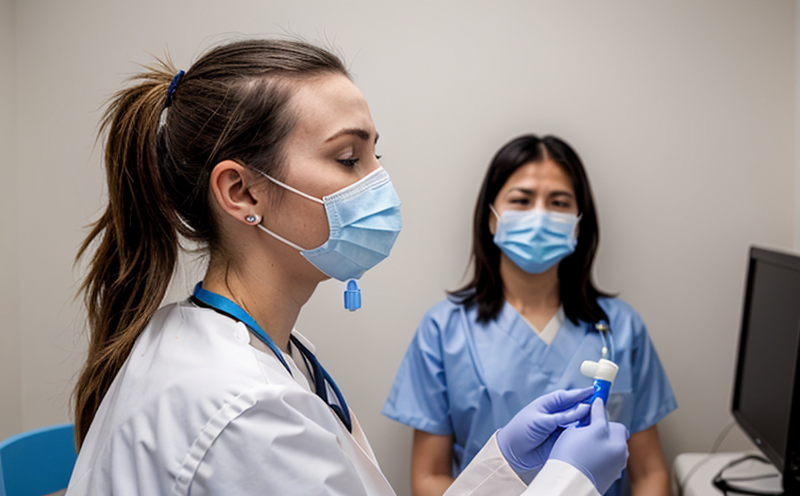Coronavirus Respiratory Testing in Livestock
The impact of respiratory diseases on livestock can be profound, affecting productivity and profitability. Coronavirus (CoV) infections in livestock have been a growing concern due to their potential to spread rapidly within herds and beyond, impacting not only the animals but also human health. Accurate and reliable testing is crucial for early detection, containment, and mitigation strategies.
Our laboratory offers specialized Coronavirus Respiratory Testing services tailored specifically for livestock. This comprehensive service ensures rapid, accurate identification of respiratory pathogens, including those belonging to the Coronavirus family, which can cause severe health issues in cattle, pigs, sheep, and other farm animals.
The testing process involves multiple stages designed to ensure precision and reliability. Initially, we collect nasal swabs or bronchoalveolar lavage (BAL) samples from affected livestock. These specimens are then transported under strict conditions to our laboratory where they undergo rigorous processing. Our team of experts uses advanced molecular techniques such as Reverse Transcription Polymerase Chain Reaction (RT-PCR), Nucleic Acid Sequence-Based Amplification (NASBA), and Loop-Mediated Isothermal Amplification (LAMP) to detect the presence of specific viral nucleic acids.
The use of these cutting-edge technologies allows for highly sensitive and specific detection, even in low concentrations. This ensures that no positive cases are missed, which is critical for effective disease management. Once tested, results are typically available within 24-48 hours, allowing quick response to outbreaks or potential introductions into non-infected herds.
Our laboratory adheres strictly to international standards and guidelines set by organizations such as the World Organization for Animal Health (OIE), the Center for Disease Control and Prevention (CDC), and the World Health Organization (WHO). This ensures that our testing methods remain up-to-date with global best practices. We also collaborate closely with local and national authorities to ensure compliance with all relevant regulations.
In addition to standard testing, we offer Surveillance Testing, which involves periodic sampling of asymptomatic animals within a herd to monitor for the presence of respiratory pathogens. This proactive approach helps in identifying potential outbreaks early, preventing their spread across herds and minimizing economic losses.
We also provide Diagnostic Support Services. Our team can assist with specimen collection training, interpretation of results, and guidance on appropriate containment and treatment measures. For research purposes, we offer custom testing protocols to meet specific client requirements.
To further enhance our service offerings, we are equipped with state-of-the-art facilities and highly trained professionals who understand the unique challenges faced by livestock health management. Our commitment is not only to provide accurate test results but also to contribute to the overall health and welfare of livestock populations worldwide.
Applied Standards
| Standard | Description |
|---|---|
| ISO 15189:2017 | International standard for quality and competence of medical laboratories. |
| EN ISO/IEC 17025:2017 | European standard for the general requirements for the competence of testing and calibration laboratories. |
| OIE Recommendations on Veterinary Diagnostic Techniques | World Organization for Animal Health recommendations covering diagnostic methods used in veterinary medicine. |
| CDC Guidelines for Respiratory Pathogen Testing | United States Centers for Disease Control guidelines for testing respiratory pathogens, including Coronaviruses. |
| WHO Laboratory Quality Assurance Recommendations | World Health Organization recommendations on the quality assurance of diagnostic laboratories. |
Quality and Reliability Assurance
- Patient sample tracking through every stage of testing.
- Dedicated quality control measures to ensure accuracy in all test results.
- Regular calibration and validation of laboratory equipment.
- Ongoing training for staff on the latest diagnostic techniques and protocols.
We have implemented stringent quality assurance procedures to maintain high standards throughout our testing processes. Our laboratories are equipped with automated systems that continuously monitor performance metrics, ensuring consistency in test outcomes. We also participate in proficiency testing programs organized by recognized bodies such as the College of American Pathologists (CAP) and the European Federation for Clinical Chemistry and Laboratory Medicine (EFCC).
Our commitment to quality is reflected in our certifications and accreditations from reputable organizations like ISO 15189:2017 and EN ISO/IEC 17025:2017. These standards provide assurance that our laboratory meets the highest international benchmarks for diagnostic accuracy and reliability.
Environmental and Sustainability Contributions
- We minimize waste by reusing disposable materials where possible and recycling others.
- Our facilities are designed to use energy-efficient equipment and processes, reducing our carbon footprint.
- We actively participate in environmental awareness programs aimed at educating the community about responsible laboratory practices.
Incorporating sustainability into our operations is a key priority. We recognize that our work not only benefits livestock but also has an impact on the broader environment and public health. By adopting eco-friendly practices, we aim to contribute positively to both the agricultural sector and the global community at large.
Our efforts in environmental stewardship extend beyond just operational practices; they include educating stakeholders about sustainable laboratory procedures and encouraging responsible use of resources within our industry. Through these initiatives, we strive to create a more sustainable future for all.





